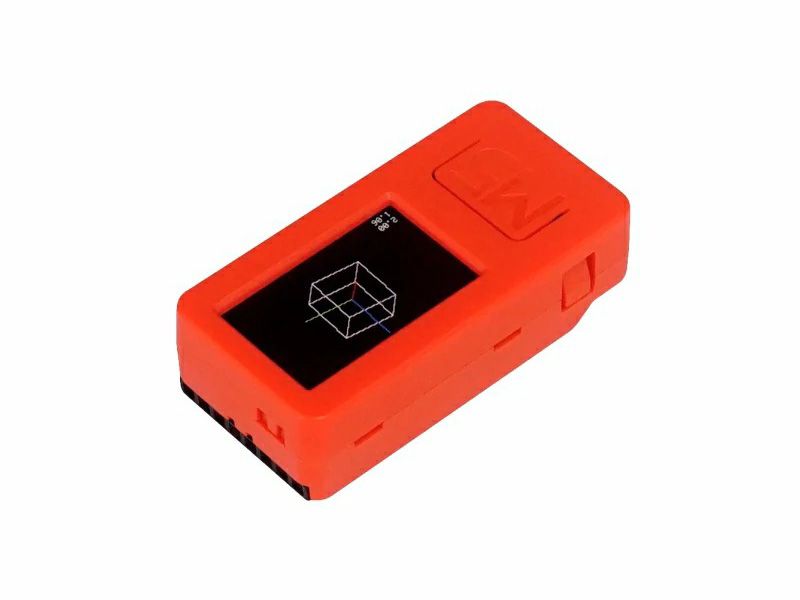
M5StickC PLUS ESP32-PICO Mini IoT by M5Stack
M5StickC PLUS is powered by ESP32-PICO-D4 with Wi-Fi and is an upgrade of the original M5StickC with a bigger screen .It is a portable, easy-to-use, open source, IoT development board. This tiny device will enable you to realize your ideas, enrich your creativity, and speed up your IoT prototyping. Developing with M5StickC PLUS takes away a lot of the pains from the development process. M5StickC Plus is one of the core devices in M5Stacks product series. The compact body is integrated with rich hardware resources, such as infrared, RTC, Microphone, LED, IMU, Buttons, PMU,etc. Improvements from the regular StickC are a buzzer, bigger screen (1.14-inch, 135 * 240 resolution LCD Screen) and more stable hardware design. This revision increases the display area by 18.7%, and the battery capacity from 95mAh to 120mAh. It also supports the HAT and Unit family of products.
Features
- ESP32-based support Wi-Fi
- Built-in 6-Axis IMU
- Red LED
- IR transmitter
- Microphone
- RTC
- Buttons, LCD(1.14 inch)
- Built-in Lithium Polymer Battery
- Extendable Socket
- Built-in Passive Buzzer
- Wearable & Wall mounted
Documentation
Purchase
Contribute
Have some info to add for this board? Edit the source for this page here.
CircuitPython 9.2.8
This is the latest stable release of CircuitPython that will work with the M5StickC PLUS ESP32-PICO Mini IoT. Use this release if you are new to CircuitPython.
Modules included in this download
_asyncio _pixelmap adafruit_bus_device adafruit_pixelbuf aesio alarm analogbufio analogio array atexit audiobusio audiocore audioio audiomixer audiomp3 binascii bitbangio bitmaptools board builtins builtins.pow3 busdisplay busio busio.SPI busio.UART canio codeop collections countio digitalio displayio dualbank epaperdisplay errno espidf espnow espulp fontio fourwire framebufferio frequencyio getpass gifio hashlib i2cdisplaybus io ipaddress jpegio json keypad keypad.KeyMatrix keypad.Keys keypad.ShiftRegisterKeys keypad_demux keypad_demux.DemuxKeyMatrix locale math max3421e mdns memorymap microcontroller msgpack neopixel_write nvm onewireio os os.getenv paralleldisplaybus ps2io pulseio pwmio rainbowio random re rotaryio rtc sdcardio select sharpdisplay socketpool socketpool.socketpool.AF_INET6 ssl storage struct supervisor synthio sys terminalio tilepalettemapper time touchio traceback ulab usb vectorio warnings watchdog wifi zlibFeatures: Wi-Fi, USB-C, Bluetooth/BTLE, Display, Battery Charging
CircuitPython 10.0.0-alpha.8
This is the latest development release of CircuitPython that will work with the M5StickC PLUS ESP32-PICO Mini IoT.
Alpha development releases are early releases. They are unfinished, are likely to have bugs, and the features they provide may change. Beta releases may have some bugs and unfinished features, but should be suitable for many uses. A Release Candidate (rc) release is considered done and will become the next stable release, assuming no further issues are found.
Please try alpha, beta, and rc releases if you are able. Your testing is invaluable: it helps us uncover and find issues quickly.
Release Notes for 10.0.0-alpha.8
Modules included in this download
_asyncio _bleio _bleio (native) _eve _pixelmap adafruit_bus_device adafruit_pixelbuf aesio alarm analogbufio analogio array atexit audiobusio audiocore audiomixer audiomp3 binascii bitbangio bitmapfilter bitmaptools board builtins builtins.pow3 busdisplay busio busio.SPI busio.UART canio codeop collections countio digitalio displayio epaperdisplay errno espidf espnow espulp fontio fourwire framebufferio frequencyio getpass gifio hashlib i2cdisplaybus io ipaddress jpegio json keypad keypad.KeyMatrix keypad.Keys keypad.ShiftRegisterKeys keypad_demux keypad_demux.DemuxKeyMatrix locale lvfontio math max3421e mdns memorymap microcontroller msgpack neopixel_write nvm onewireio os os.getenv paralleldisplaybus ps2io pulseio pwmio rainbowio random re rotaryio rtc sdcardio select sharpdisplay socketpool socketpool.socketpool.AF_INET6 ssl storage struct supervisor synthio sys terminalio tilepalettemapper time touchio traceback ulab usb vectorio warnings watchdog wifi zlibFeatures: Wi-Fi, USB-C, Bluetooth/BTLE, Display, Battery Charging
Absolute Newest
Every time we commit new code to CircuitPython we automatically build binaries for each board and language. The binaries are stored on Amazon S3, organized by board, and then by language. These releases are even newer than the development release listed above. Try them if you want the absolute latest and are feeling daring or want to see if a problem has been fixed.
Previous Versions of CircuitPython
All previous releases of CircuitPython are available for download from Amazon S3 through the button below. For very old releases, look in the OLD/ folder for each board. Release notes for each release are available at GitHub button below.
Older releases are useful for testing if you something appears to be broken in a newer release but used to work, or if you have older code that depends on features only available in an older release. Otherwise we recommend using the latest stable release.
